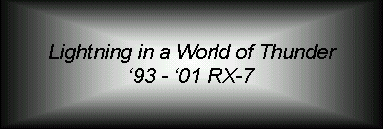
Last updated: March 1, 2002
Reliability Modifications
The following modifications may help to increase reliability. If you are looking
at buying a used 3rd gen, don't let all of this put you off. It is merely good
really thorough documentation, which you might not see for other cars (such as the
Supra, which some of the guys on their email list don't seem to want to admit might
have any problems whatsoever). See the 3rd gen Buyer's Guide
for more info on what to look for before you buy a used car.
- Proper Maintenance!!! Above all make sure you
change fluids etc at least as often as the manual
recommends. The cooling system is a weak link in the car, as you will see from
the next few mods, so flush it on the
recommended intervals.
- Replace the precat with a
downpipe to reduce heat in the engine bay.
- Replace the stock radiator with an
aftermarket one for improved cooling.
- Make sure the radiator is ducted
properly.
- Replace the cooling system Air Separation Tank (AST) with an
aftermarket one or
eliminate it.
- Perform the cooling fan mod.
- Consider installing a water temp
gauge. The stock one is truly an idiot light masquerading as a gauge.
- Install a turbo timer
so the car will cool down properly.
- Consider adding a second
oil cooler to aid cooling. Someone mentioned that
the rotary depends on oil cooling a lot more than piston engines.
- Do not use synthetic oil in the engine. Synthetic lubes
are fine for the tranny and diff.
- Install a
boost gauge so you can identify changes ASAP.
Perform the boost test occassionally too.
- Install an
Air Fuel ratio meter so you can identify problems.
- On a related note, an AF meter might help identify a clogged
fuel filter.
- Only use premium fuel. See the gas FAQ.
- Not a requirement, but think about pre-mixing
oil in the gas tank. The rotary injects oil into the combustion chamber,
so this will act as insurance. Also on this subject, the oil injection means
that you need to keep on top of oil level. It will go down quickly compared
to other types of engines Unless you own a '74 Pinto that gets 3 quarts to
the mile :-).
- Consider installing a
knock sensor to help protect against
detonation.
- Replace the
O2 sensor when recommended, since this helps determine
the AF mixture. If it is failing, it could contribute to detonation.
- If the Check Engine light comes on, investigate
immediately.
- Retorque the tension bolts on the
rear rotor housing. This can be done easily as part of clutch replacement. This
may help prevent O-ring problems.
- Replace the weak anti-sway bar mounts ASAP.
These are known to break and possibly case frame cracking even with minor enthusiastic
driving.
- If the car is to be stored for the winter or longer period, follow the
instructions.
- Sign up for the email list so you can find out
about new issues, reliability upgrades, etc.
- Read the Frequently Asked Questions.
- Read the Technical Service Bulletins.
- If you are going to modify the car, do all of the above first, then do it in the
proper order. See the Upgrades
section of this site once you have read the upgrade plans section.
There are other things you may want to consider, but this may be a case of "if it
ain't broke, don't mess with it". i.e.- you may just end up causing yourself
headaches or these may just be better off left until a problem occurs. These are:
- Replacing the turbo control
vacuum hoses.
- Clean the fuel injectors. Do this at the
scheduled interval.
- Replace the shift select spindle, which
might help prevent 5th gear synchro failure. Do this when the clutch is replaced.
- Replace the EGR valve. Only do when
tested bad or at scheduled interval.

![[ Mail me ]](mail.gif)
![[ To Lightning home page ]](rx7_home.gif)
![[ To my home page ]](my_home.gif)
![[ Copyright Notice ]](copyright.gif)


